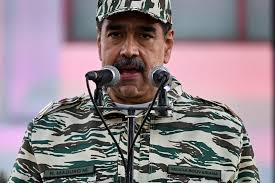
Venezuela Deploys Troops to Colombia Border as US Naval Forces Join Cartel Crackdown

 :
| Updated On: 26-Aug-2025 @ 12:15 pm
:
| Updated On: 26-Aug-2025 @ 12:15 pmSHARE
Venezuela has announced the deployment of 15,000 troops to its border with Colombia in an effort to combat drug trafficking, while the United States has moved additional naval forces into the southern Caribbean as part of an operation against Latin American drug cartels.
On Monday, Venezuelan Interior Minister Diosdado Cabello confirmed that Caracas would send the troops to strengthen security in the Zulia and Tachira states, both of which border Colombia. In his statement, Cabello emphasized that Venezuela is actively fighting drug trafficking and cartels, pointing to the seizure of 53 tonnes of drugs so far in 2025. He further explained that the troop deployment would be supported by aircraft, drones, and riverine patrols, as part of a broader effort to dismantle criminal networks operating in the border regions. Cabello also urged Colombian authorities to adopt similar measures to ensure peace and security along the border.
This major deployment of Venezuelan forces comes against the backdrop of escalating tensions with the United States. The Trump administration has repeatedly accused Venezuela’s left-wing president, Nicolas Maduro, of being directly involved in cocaine trafficking and collaborating with drug cartels. Washington officials have also alleged that both Maduro and Cabello are linked to the Cartel de los Soles, or “Cartel of the Suns,” an organization designated as a terrorist group by the U.S. government.
In line with these accusations, the U.S. government recently increased its financial incentives for capturing Venezuela’s top leaders. Last week, the reward for Maduro’s capture on drug-related charges was doubled to $50 million, while earlier this year, the reward for Cabello’s arrest or prosecution was raised from $10 million to $25 million. These moves underscore Washington’s aggressive stance against Venezuela’s leadership, which it views as complicit in the global narcotics trade.
Maduro has consistently rejected these allegations, framing them as part of a larger U.S. attempt to engineer regime change in Venezuela. In response to the escalating threats from Washington, Maduro has launched a nationwide campaign to expand Venezuela’s militia forces, urging thousands of new recruits to join in order to strengthen national security. Speaking to local media on Monday, he declared his confidence in Venezuela’s ability to resist what he described as an “imperialist threat” to the peace of both the country and the continent.
Meanwhile, the U.S. military has expanded its presence in the Caribbean. According to Reuters, two additional navy ships—the USS Lake Erie, a guided missile cruiser, and the USS Newport News, a nuclear-powered fast attack submarine—are expected to arrive in the southern Caribbean by early next week. These vessels will join an amphibious squadron that had already been deployed off Venezuela’s coast, comprising the USS San Antonio, USS Iwo Jima, and USS Fort Lauderdale. Reports suggest the squadron carries about 4,500 U.S. service members, including 2,200 Marines.
President Donald Trump has made targeting Latin American drug cartels a central theme of his administration’s security policy. His administration has designated several criminal organizations, including Mexico’s Sinaloa Cartel and Venezuela’s Tren de Aragua, as global terrorist groups. The dual deployment of Venezuelan troops on the Colombia border and U.S. naval forces in the Caribbean highlights the increasingly militarized approach on both sides, further heightening tensions in the region.